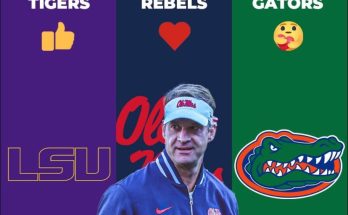Why “The Greatest Coach in the World” is Mark Pope, As Said by Koby Brea
In the world of sports, the role of a coach is pivotal in shaping athletes, teams, and legacies. A coach’s influence extends far beyond the confines of strategy and technique; they mold character, instill discipline, and inspire greatness. When Koby Brea, a prominent player in college basketball, referred to Mark Pope as “the greatest coach in the world,” it wasn’t just a casual remark—it was a statement of deep respect and admiration for a coach who has proven time and again that his impact on players and the game is truly exceptional. So, what makes Mark Pope so special in the eyes of players like Koby Brea, and why does he deserve this title?
1. A Legacy of Excellence in Coaching
Mark Pope’s journey to becoming a highly respected coach is a story of dedication, growth, and a deep understanding of the game of basketball. Pope was not only a successful player in his own right but also someone who seamlessly transitioned into coaching, making an indelible mark on every program he led.
Starting his playing career at the University of Kentucky, Pope was part of a highly competitive environment that shaped his perspective on hard work, discipline, and the importance of teamwork. After playing professionally for several years, Pope turned his attention to coaching, first starting as an assistant at the University of BYU (Brigham Young University). It wasn’t long before he made the leap to head coach at BYU, where he solidified his reputation as a leader and a builder of programs.
Throughout his coaching career, Pope has taken teams that were struggling and transformed them into powerhouse contenders. His time as a coach at Utah Valley University stands as a testament to his ability to rebuild and revitalize a program. By bringing in new strategies, attracting top talent, and fostering a winning culture, Pope turned Utah Valley into one of the most feared teams in college basketball.
When Pope took over the head coaching role at BYU in 2019, he inherited a program with high expectations. Under his leadership, the team has consistently been a top contender in the NCAA tournament, demonstrating Pope’s expertise in recruiting, training, and guiding his players to greatness.
2. Relationship with Players: A True Mentor
While Mark Pope’s technical knowledge of basketball is undeniable, his success as a coach can be attributed just as much to his unique ability to build meaningful relationships with his players. When Koby Brea refers to him as “the greatest coach in the world,” he is not only recognizing Pope’s basketball acumen but also the genuine care he shows for his players as individuals.
Mark Pope’s relationship with his athletes is rooted in mutual respect, understanding, and a deep commitment to their personal growth. He is known for treating each player like a person, not just a part of a team. This approach allows Pope to connect with his players on a human level, creating an atmosphere of trust and loyalty. It is not uncommon for players to describe Pope as a mentor who goes above and beyond the usual expectations of a coach, someone who is truly invested in their lives both on and off the court.
Pope has been praised for his ability to motivate and encourage players during difficult times. He takes the time to understand the personal challenges his players face, whether it’s related to academics, family, or other aspects of their lives. This emotional intelligence allows Pope to tailor his coaching approach to meet the needs of each player, helping them navigate their own personal growth as well as their basketball journey.
Koby Brea, who has benefited from Pope’s mentorship, often speaks highly of Pope’s ability to inspire and push players to reach their full potential. This is an essential aspect of what makes Pope so special as a coach—the way he builds a sense of community and purpose within his teams. By fostering a supportive environment, Pope instills confidence in his players, helping them not only become better athletes but also better people.
3. Coaching Philosophy: Emphasis on Teamwork and Development
Mark Pope’s coaching philosophy is centered around the idea of building a cohesive and well-rounded team. His teams are known for their strong defensive play, disciplined offense, and most importantly, their unselfishness. Pope values teamwork above all else and believes that success is achieved when players work together towards a common goal.
Under Pope’s leadership, players understand that they are part of something bigger than themselves. Whether it’s a star player or someone coming off the bench, Pope emphasizes that every individual has a vital role to play. This approach encourages a culture of collaboration and accountability within the team, leading to a highly effective and unified squad. Pope’s success in molding teams that play together cohesively is reflected in the consistency and excellence of his programs over the years.
In addition to fostering teamwork, Pope places a significant emphasis on the development of his players. He understands that a coach’s job is not just to win games but to develop athletes into well-rounded individuals who are prepared for success in life. This focus on player development is evident in the way Pope incorporates both physical and mental training into his coaching regimen. His players are not only taught the skills necessary to succeed on the court but also the mental toughness and resilience needed to face the challenges of life.
Koby Brea’s growth as a player under Pope’s guidance is a perfect example of this coaching philosophy in action. Pope’s ability to develop Brea’s skills, instill confidence, and help him refine his game has contributed significantly to Brea’s success on the court. As a result, Brea has flourished both as an individual player and as a leader within the team.
4. Adaptability and Innovation
One of Mark Pope’s most distinguishing traits as a coach is his adaptability and willingness to innovate. College basketball is a constantly evolving sport, with new trends, strategies, and challenges emerging every season. A successful coach must be able to adapt to these changes and continue to find ways to improve and stay competitive.
Pope is known for being open to new ideas and for incorporating cutting-edge tactics into his coaching style. Whether it’s leveraging advanced statistics to inform player development or experimenting with new offensive and defensive schemes, Pope is always looking for ways to stay ahead of the curve. This innovative approach has kept his teams competitive at the highest levels of college basketball, even when facing tough competition.
Koby Brea’s recognition of Pope as “the greatest coach in the world” can partly be attributed to Pope’s willingness to embrace change and his ability to adapt his strategies to suit the strengths of his players. By staying flexible and open-minded, Pope ensures that his teams are always prepared to face the challenges that come their way, no matter how much the game of basketball evolves.
5. Impact Beyond the Court
While Mark Pope’s influence is most apparent on the basketball court, his impact extends far beyond the game itself. Pope is dedicated to preparing his players for success in every aspect of their lives. Whether it’s through academic support, mentorship, or simply being a positive role model, Pope ensures that his players leave his program as better people, not just better athletes.
The positive impact Pope has had on his players’ lives is something that Koby Brea and others frequently mention. Pope’s commitment to creating well-rounded individuals who can thrive in all areas of life is a key reason why his players hold him in such high regard. He doesn’t just teach them how to be better basketball players—he teaches them how to be leaders, how to navigate life’s challenges, and how to positively impact their communities.
This holistic approach to coaching sets Pope apart from many others in the field. He understands that sports are about much more than just winning games—they are a platform for teaching valuable life lessons, fostering personal growth, and instilling values that will last a lifetime. This is why so many players, including Koby Brea, view Pope as not just a coach, but a mentor and a guide in their lives.
6. The Power of Recognition
When Koby Brea refers to Mark Pope as “the greatest coach in the world,” it is more than just a compliment—it’s a reflection of the deep respect that players have for him. In a world where the spotlight often shines on athletes and their achievements, Pope’s ability to receive recognition from his players speaks volumes about his impact as a coach. His influence extends far beyond the X’s and O’s of the game, touching the lives of those he coaches in a way that few others can replicate.
Players like Brea are not only acknowledging Pope’s success on the court but are also recognizing the profound effect he has had on their lives. Pope’s reputation as a coach who genuinely cares for his players and strives to make them better people is a powerful testament to his greatness.
Mark Pope’s journey as a coach is one of excellence, dedication, and an unwavering commitment to his players. His ability to develop talent, foster meaningful relationships, and build winning programs makes him a true legend in the world of basketball. As Koby Brea has eloquently put it, Mark Pope is “the greatest coach in the world,” and it’s easy to see why. Pope’s impact goes far beyond the basketball court—he shapes lives, builds character, and leaves a lasting legacy that will be felt for years to come.
In a profession where success is often measured in wins and losses, Mark Pope stands out as a coach who has redefined what it means to lead, inspire, and make a difference. His dedication to his players, his innovative approach to coaching, and his emphasis on personal development make him not just a great coach but a mentor who changes lives. And for players like Koby Brea, that is a title that holds immeasurable value.



